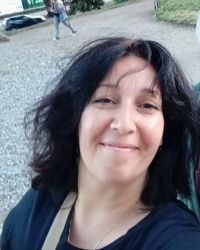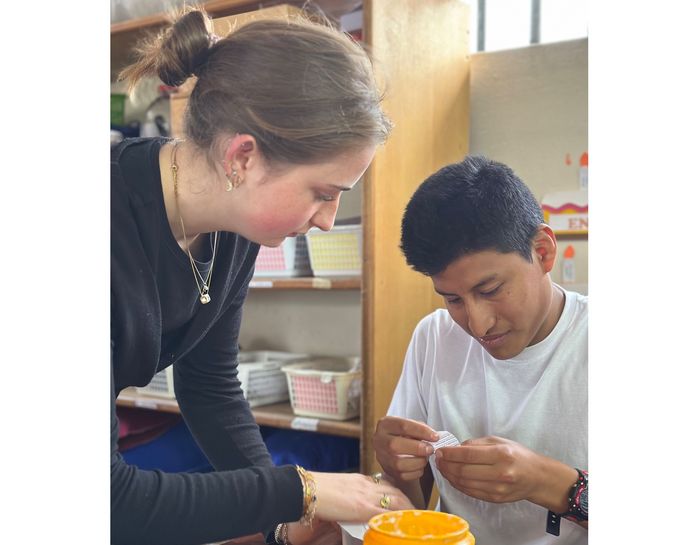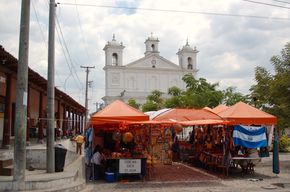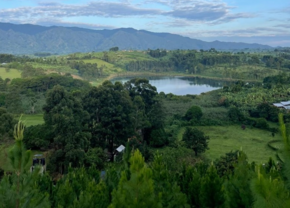by Lea Thin, freelance author
Traveling can be challenging for people with disabilities, but an inclusive volunteer service can break down barriers and create new opportunities. The weltwärts programme of the Federal Ministry for Economic Cooperation and Development, in which Brot für die Welt participates, offers young people with disabilities the chance to contribute to social justice, education, environmental protection, and human rights, particularly in countries of the Global South. At the same time, people with disabilities in the host countries benefit from targeted inclusion projects that improve long-term barrier-free structures and enhance social participation. A volunteer service thus becomes a sustainable exchange that raises awareness and broadens perspectives. TourismWatch spoke with three participants about inclusion in the weltwärts volunteer service.
Interview with Alice, a volunteer from Germany

Alice, you have been working with the organization Tierra Nueva in Ecuador for six months, supporting children and young people with disabilities. What requirements did you have to meet?
The Kindermissionswerk follows a child and youth protection policy. One of the requirements was a declaration, in which I agreed, for example, to report any concerns, allegations, incidents, or signs of endangerment to those responsible. Experience was desired but not required for my application. More important were openness and a willingness to embrace the role. Volunteers are usually young people who experience different facets of the world through their service and may later pursue a social profession. I quickly realized that these young people are just normal people with normal problems. Volunteering therefore offers valuable insights and promotes tolerance.
What surprised you most?
There are some positive aspects in Ecuador. For example, parents of children with intellectual disabilities receive 50 USD per month from the government, which is pretty much in Ecuador. Sometimes, people with disabilities also pay lower fees, such as for public transportation. However, using a wheelchair on a bus is impossible. The metro system is mostly accessible, with staff available to assist disabled passengers. But overall, accessibility in Quito is poor. There is a four percent employment quota for people with disabilities, but few companies comply with it.
Is Tierra Nueva addressing these challenges?
Yes, Tierra Nueva is a progressive organization with multiple centers and hospitals. One key goal is to integrate children and young people with disabilities into daily life and employment. In the mornings, we focus on fine motor skills, such as drawing and cutting out circles when making Valentine’s Day roses. There is also a large carpentry workshop. In the afternoons, the children practice reading, writing, and math. This enables some of them to enter the job market within two years. Recently, one teenager was hired as a cleaner at a Tierra Nueva hospital. For others, integration takes longer, depending on their skills and level of disability.
Interview with Camila, a volunteer from Colombia

Camila, you are currently volunteering with the organization World-Horizon in Germany. Did you have any doubts about applying due to your physical limitations?
I had a stroke at 16, which left me partially paralyzed on my left side. I also have bladder issues. Still, I felt safe applying because World-Horizon partners with my school in Colombia. However, I wasn’t sure I would be accepted. During my first interview, I was afraid to talk about my condition—especially because I need medical supplies like catheters. But it turned out everyone was welcoming and never treated me differently. From the moment I was accepted, World-Horizon made all the necessary arrangements to ensure I had everything I needed.
What has your experience in Germany been like? How does accessibility compare to Colombia?
Germany is very different from Colombia in many ways. It’s safer for me to walk the streets here. Drivers respect crosswalks and pedestrian lights. However, I faced discrimination as a Latina. Sometimes, people refused to give me a seat on public transport, which never happened in Colombia. On the other hand, I also met many helpful people who assisted me with my suitcase or offered me their seat.
What will you take home from your volunteer experience?
My time in Germany has given me more than I ever expected. I’ve become independent, learned new things, and faced daily challenges. I discovered a strong, courageous side of myself. My goal is to make a lasting impact and show other people with disabilities that the limits only exist in our minds. I hope my experience inspires others to pursue their dreams.
Interview with Maria Noel Gonzalez Weisz, Director of the Instituto de Buena Voluntad in Uruguay

Maria Noel, your organization works with young people with disabilities from a low-income neighborhood in Montevideo. What challenges do they face?
People with disabilities from socially disadvantaged families face higher discrimination and are often excluded from public life. A major problem is limited access to essential services, especially in healthcare. Diagnosis wait times are extremely long. Families often struggle to access support services like caregiving unless they can afford private care.
What about access to education?
Unfortunately, young people with disabilities from poor families have great difficulty accessing quality education. Schools in low-income areas often lack inclusive facilities. There are barriers for accessing the buildings and rooms. There are not enough specialized teachers and learning resources. This severely limits future opportunities for these children.
Your organization hosts international volunteers. What are your selection criteria?
One key requirement is Spanish language proficiency, as volunteers must communicate effectively with the adolescents and our educators. We work in a sensitive field, so volunteers must be flexible and able to adapt to changing situations. They must be solution-oriented and capable of handling unexpected challenges. But patience is also very important when the teenagers behave unpredictably.
How are volunteers prepared for their work with people with disabilities?
We don’t work with severely disabled youth, so volunteers don’t need to assist with toileting or feeding. Instead, they support educational and recreational activities as well as developmental exercises. The weltwärts programme offers preparatory seminars. However, those focus more on the Latin American context rather than our specific work.
Are there any tasks volunteers may NOT do?
Yes. It is very important to say clearly that our volunteers do not replace staff. They are never alone with the youth—our social workers are always present. And our volunteers must maintain professional boundaries. They are not allowed to maintain personal contact with the youth after their service. This rule is essential to protect against exploitation and abuse.




